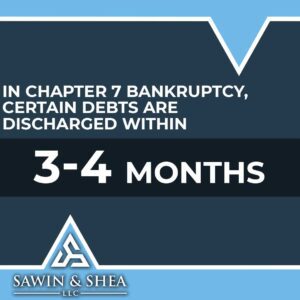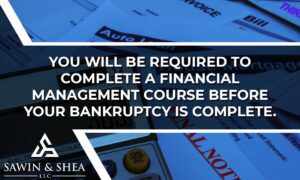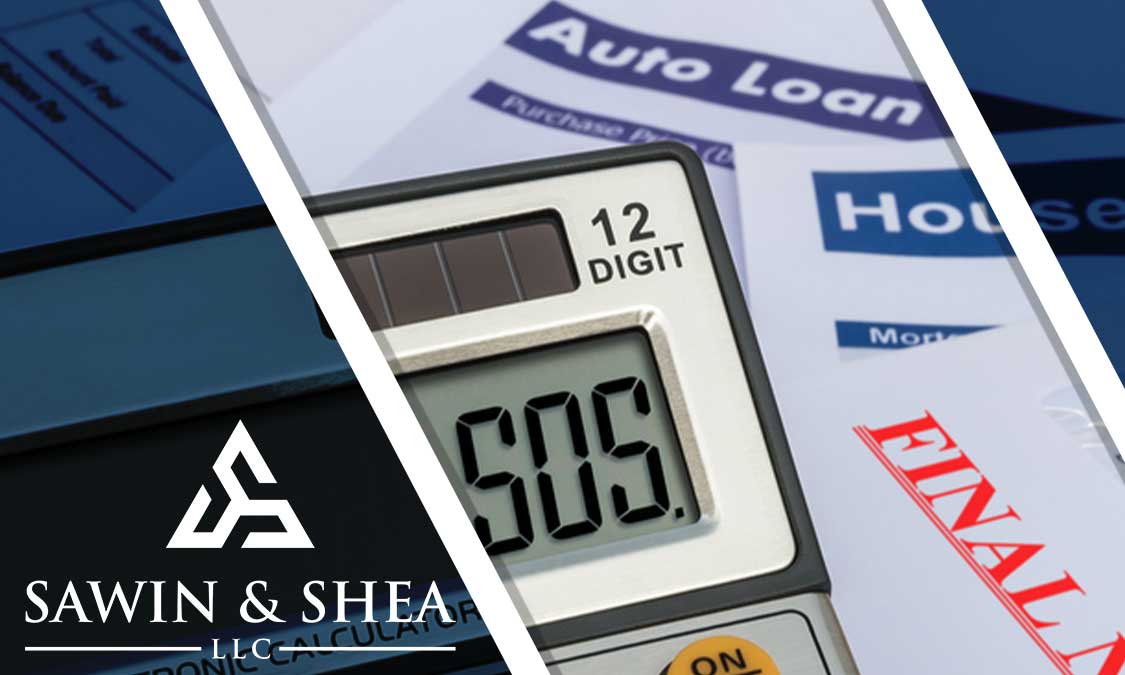What is Bankruptcy?

Bankruptcy is an opportunity for someone to forge their way through what seems like an impossible debt-ridden situation and come out the other side. It is a legal way of either consolidating or discharging allowable debts in order to get a fresh start. Although businesses can also declare bankruptcy, we will focus on personal bankruptcy in this article.
In Chapter 7 Bankruptcy, (sometimes misleadingly described as liquidation bankruptcy), certain debts are discharged within 3-4 months. After taking a means test, you will file papers and a petition with the bankruptcy court. This will immediately stop your creditors from being able to contact you to demand payment.
You and your bankruptcy attorney will next attend either a creditor meeting or a 341 hearing with your court-appointed bankruptcy trustee. At this hearing (which is not in a courtroom and does not have a judge), your documents will be checked for authenticity, and you will establish your assets, liabilities, expenses, and income.
Chapter 13 Bankruptcy is a Federal Bankruptcy Court-sanctioned debt reorganization plan. It works through reorganization, as opposed to liquidation, and you do not have to pass the Chapter 7 means test. You are not allowed to have more than $465,275 of unsecured debt (such as credit card or medical debt) or more than $1,395,875 of secured debt (such as a house, property, or vehicle).
Under Chapter 13 Bankruptcy, you have time and a plan in which to repay your debts. For many of them, such as alimony, child support, and secured debts, you will pay the entire amount, but for some unsecured debts, you may end up paying only what the court decides you can afford and is feasible, given your income.
Which Debts Cannot be Discharged in Bankruptcy?
Section 523 of the United States Bankruptcy Code explains which debts cannot be discharged in bankruptcy:
- Child support.
- Alimony payments.
- Car loans (unless you allow your car to be repossessed, in which case you will not owe any past payments).
- Debts from willful and reckless acts, embezzlement, fraud, or larceny.
- Property liens: If you want to keep your house, you will have to pay what you owe on the mortgage and keep payments current. If you allow the bank to take your house, these debts will be discharged.
- HOA fees: As with your car and house debts, this depends on what you decide to do. If you keep your house, you will need to pay all HOA fees that you owe and continue to pay future fees as they are due. If you do not keep your house, your HOA fees will be discharged.
- Certain taxes: Your bankruptcy attorney will be able to provide more details about this but debts to the IRS or to the Indiana Department of Revenue that are older than 3 years may be discharged.
- Most federal student loans.
- Court fines.
- Unscheduled debts: These are debts you neglected to list when you filed for bankruptcy.
Which Debts Can be Discharged in Bankruptcy?



- Medical bills.
- Credit card debts: Keep in mind the fact that you cannot buy more than $1,150 of luxury goods within 60 days of filing for bankruptcy.
- Overdue utility bills: This doesn’t mean that you will be absolved of all future utility bills, but it does prevent utility companies from being able to shut off your water or electricity because of past bills.
- Civil court judgments (not counting anything that was based on fraud).
- Rent that is past due.
- Personal loans.
- “Payday” type loans.
- Collection agency bills.
- Dishonored checks (unless they were based on fraud).
You will be required to complete a financial management course before your bankruptcy is complete.
Chapter 7 Bankruptcy Discharge
After approximately 4 months, the court will issue a bankruptcy discharge. You will no longer owe most of your debts and a copy of the order of discharge will be mailed to the applicable creditors. They will no longer be allowed to contact you to demand payment of the discharged debts, and you will be free to start rebuilding. The bankruptcy will remain on your record for 7-10 years.
Chapter 13 Bankruptcy Discharge
Under Chapter 13 Bankruptcy proceedings, your debts will not be discharged as quickly as in Chapter 7. Your debt reorganization plan will last between 3-5 years, and only when it is completed will you receive your discharge.
However, your creditors will not be allowed to try to collect from you while you wait to have your debt discharged and your debts will be frozen in an automatic stay, so you will not be foreclosed on or lose your vehicle as long as you make the agreed-upon monthly payments to your trustee.
Chapter 13 Bankruptcy is sometimes called “the wage earner’s plan.” Because you either repay all or most of your debt, it doesn’t stay on your credit report as long as a Chapter 7 Bankruptcy does. It is generally removed automatically 7 years after the date you file your bankruptcy.
If you have questions about how to apply for bankruptcy discharge, consult an experienced bankruptcy attorney to make sure that it is the right choice for you, and if so, to help you navigate the myriad Indiana bankruptcy laws.
At Sawin & Shea, LLC, we understand that hiring an attorney to help you file bankruptcy is scary. We are committed to providing compassionate and non-judgmental representation to all of our clients. Our attorneys know exactly what is a discharged bankruptcy and have helped thousands of people just like you get the fresh start they deserve. We are here to help.
Speak to an attorney today at (317) 759-1483 or contact us online.



